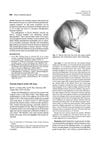April 2023 in “Journal of Investigative Dermatology” Chronic graft-versus-host disease in the skin shows strong Th1 immune response and unique barrier issues.
May 2022 in “Journal of the Dermatology Nurses' Association” The convention highlighted the importance of comprehensive patient care and early diagnosis in dermatology.
[object Object]  October 2018 in “Springer eBooks”
October 2018 in “Springer eBooks” The document concludes that various topical medications are effective for skin conditions but often cause skin irritation as a side effect.
December 2017 in “Annales de dermatologie et de vénéréologie” In 2017, pediatric dermatology advanced with new treatments and insights into various skin conditions in children.
 April 2016 in “Journal of The American Academy of Dermatology”
April 2016 in “Journal of The American Academy of Dermatology” People with certain allergic conditions or higher white blood cell counts have more severe hair loss, and treating hair and nail side effects early in melanoma therapy can improve quality of life.
 January 2015 in “Dermatology”
January 2015 in “Dermatology” The document covers various dermatological treatments and conditions.
 September 2009 in “Pediatric Dermatology”
September 2009 in “Pediatric Dermatology” UVB is good for a skin condition in Asian kids, a lotion works for head lice, a drug helps with a skin blistering disorder, a foam reduces itchiness in skin inflammation, birthmarks can be more widespread, and criteria for a neurocutaneous disorder were agreed upon.
 489 citations,
November 2021 in “Signal Transduction and Targeted Therapy”
489 citations,
November 2021 in “Signal Transduction and Targeted Therapy” The JAK/STAT pathway is important in cell processes and disease, and JAK inhibitors are promising for treating related conditions.
253 citations,
December 2007 in “Journal of Investigative Dermatology” Hair follicles prevent NK cell attacks to avoid hair loss.
 191 citations,
February 2002 in “Archives of Dermatology”
191 citations,
February 2002 in “Archives of Dermatology” Some herbal therapies may help with skin conditions, but more research is needed to confirm their safety and effectiveness.
 105 citations,
September 1995 in “Journal of The American Academy of Dermatology”
105 citations,
September 1995 in “Journal of The American Academy of Dermatology” Recombinant cytokine therapy can cause skin reactions ranging from mild to severe.
 77 citations,
June 2017 in “Advances in Therapy”
77 citations,
June 2017 in “Advances in Therapy” New treatments for Alopecia Areata, like JAK inhibitors, show promise for hair regrowth and are likely to change future treatment approaches.
[object Object]  67 citations,
July 2016 in “Reviews in Endocrine and Metabolic Disorders”
67 citations,
July 2016 in “Reviews in Endocrine and Metabolic Disorders” Stress can worsen skin conditions by affecting hormone levels and immune response.
 48 citations,
October 1996 in “Dermatologic clinics”
48 citations,
October 1996 in “Dermatologic clinics” Some treatments can help with hair regrowth in alopecia areata, but results vary and long-term use is often needed without changing the disease's outcome.
 42 citations,
April 2021 in “Journal of clinical pharmacology”
42 citations,
April 2021 in “Journal of clinical pharmacology” Baricitinib helps treat several diseases, including COVID-19, but has side effects and needs careful monitoring.
 40 citations,
November 2019 in “Frontiers in Endocrinology”
40 citations,
November 2019 in “Frontiers in Endocrinology” Metabolic Syndrome is linked to several skin conditions, and stem cell therapy might help treat them.
40 citations,
January 2018 in “International journal of trichology” Healthy scalp reduces hair loss by managing oxidative stress.
36 citations,
January 2015 in “Clinical and Translational Allergy” Humans and pets share similar allergy mechanisms, and studying pet allergies can help treat both human and animal allergies.
 26 citations,
May 2021 in “International Journal of Molecular Sciences”
26 citations,
May 2021 in “International Journal of Molecular Sciences” Cheonggukjang may help prevent and manage various diseases and improve overall health, but its odor and safety concerns need addressing.
 24 citations,
November 1992 in “Journal of the American Academy of Dermatology”
24 citations,
November 1992 in “Journal of the American Academy of Dermatology” Early diagnosis and aggressive treatment are crucial for better outcomes in lymphomatoid granulomatosis.
 22 citations,
November 2018 in “Brazilian Journal of Pharmaceutical Sciences”
22 citations,
November 2018 in “Brazilian Journal of Pharmaceutical Sciences” New physical methods like electrical currents, ultrasound, and microneedles show promise for improving drug delivery through the skin.
 16 citations,
January 2021 in “Dermatology and therapy”
16 citations,
January 2021 in “Dermatology and therapy” An imbalance in gut bacteria is linked to skin immune diseases and may affect their outcomes and related health issues.
 14 citations,
December 2010 in “Dermatologica Sinica”
14 citations,
December 2010 in “Dermatologica Sinica” New treatments for hair loss show promise, but more development is needed, especially for tough cases.
 12 citations,
June 2010 in “Journal of dermatology”
12 citations,
June 2010 in “Journal of dermatology” Some patients with severe alopecia areata developed skin darkening from their treatment, which may indicate a less effective response to the therapy.

The new treatment regimen was effective in promoting significant hair growth in all 15 male patients with androgenic alopecia.
 9 citations,
January 2019 in “Postepy Dermatologii I Alergologii”
9 citations,
January 2019 in “Postepy Dermatologii I Alergologii” The skin acts like an endocrine organ, making hormones that affect skin diseases and respond to stress.
 9 citations,
March 2011 in “Oxidative stress and disease”
9 citations,
March 2011 in “Oxidative stress and disease” Some herbal treatments are effective for skin disorders, but more research and regulation are needed.
 8 citations,
September 2021 in “Journal of Cosmetic Dermatology”
8 citations,
September 2021 in “Journal of Cosmetic Dermatology” Some diets and supplements might help with skin disorders, but their effectiveness varies and more research is needed.
 8 citations,
September 2016 in “Reviews in Endocrine and Metabolic Disorders”
8 citations,
September 2016 in “Reviews in Endocrine and Metabolic Disorders” Skin health and diseases are closely linked to metabolic processes.
 8 citations,
October 1989 in “Journal of the American Academy of Dermatology”
8 citations,
October 1989 in “Journal of the American Academy of Dermatology” A 5-year-old boy's seasonal hair loss is linked to his allergies.























